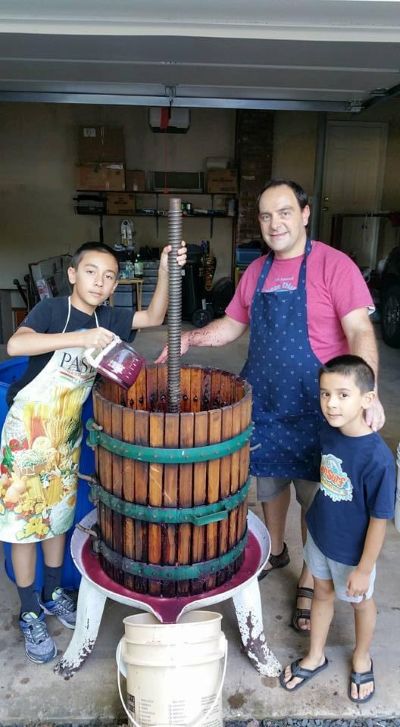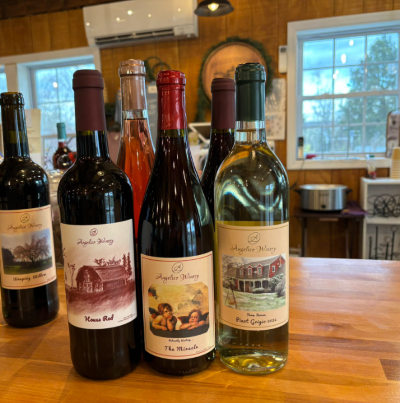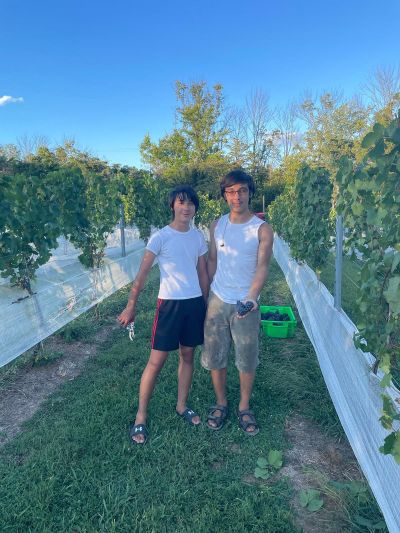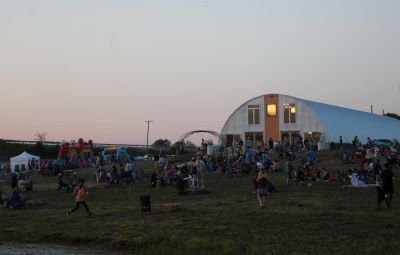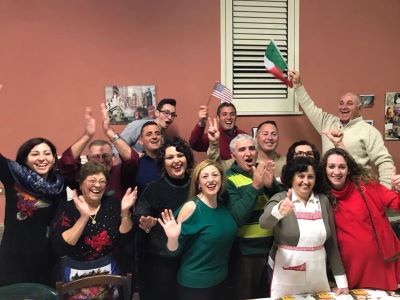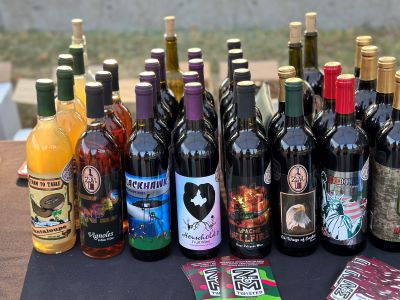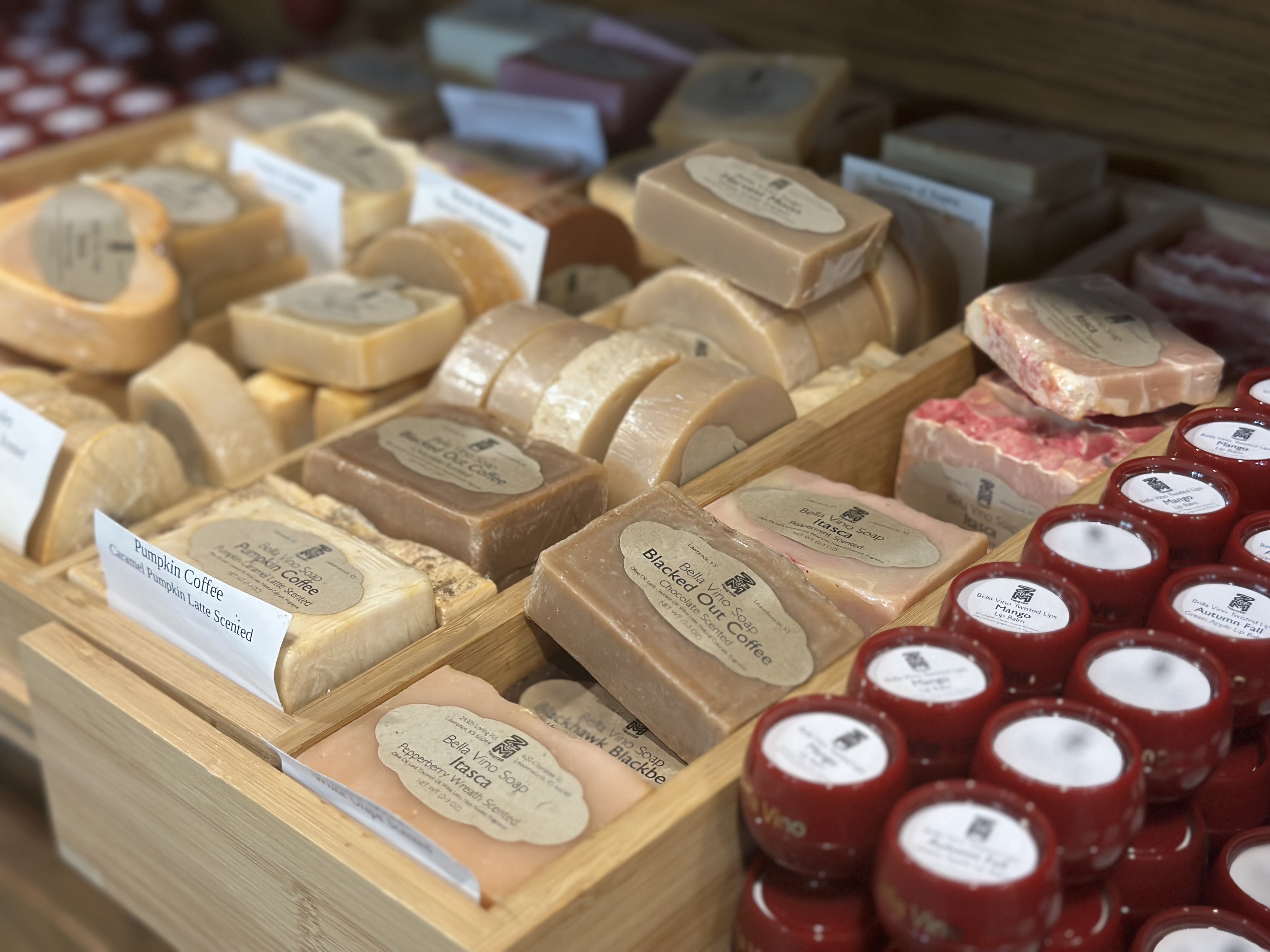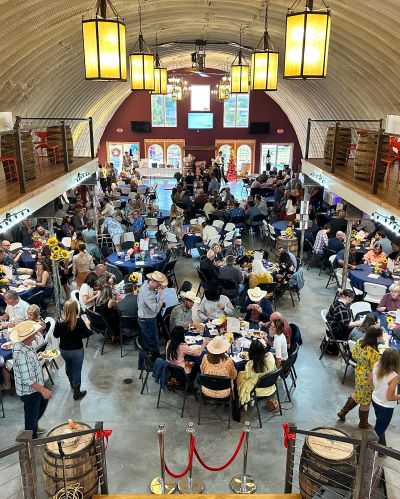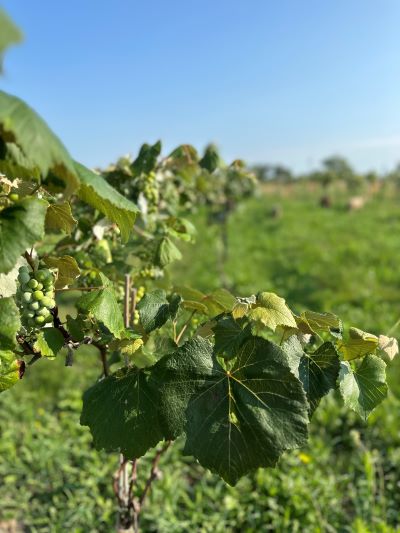Wine has always been a part of Ottavio Angelico's life. He grew up amid generations of winemakers in Grammichele within the Province of Catania, Sicily. While he chose to embark on a different path, studying robotics engineering in Canada and finding work in the packaging industry in the United States, those roots drew him back.
Three years ago, he and his wife, Lily, opened Angelico Winery in Lambertville, New Jersey, near the banks of the Delaware River. Visitors can pull up a chair at the 50-person tasting room and sip wines from familiar grapes, such as Barbera, Sangiovese, Cabernet Franc, Chardonnay, Pinot Grigio, and Riesling, as well as more unique varieties, like Baco Noir and Traminette. All are picked by hand from the couple's vineyard. The wines are produced using low-intervention, natural winemaking techniques that embrace the unique microbial environment of the Angelico vineyard, in contrast to the more technical, controlled winemaking approaches common in the United States.
Lily and the two Angelico sons oversee most operations for the team of 10, while Ottavio continues to work as a full-time packaging manager for L'Oréal. Thus, the winery is truly a family business.
Ottavio and I discussed his journey, unique winemaking process, challenges, rewards, and what he hopes to share along the way.
How did Angelico Winery get its start?
I'm an engineer in L'Oreal's packaging department. I would buy grapes from a local supplier and make wine at home. It was, for me, a passion, a hobby, something that expressed my culture.
I was buying equipment to the point where I had a mini lab in my basement. I read books, and my winemaking improved. One day, I just said to myself, "The wine here, in the United States, honestly is just waking up." I felt like it was missing somebody who could share some background or maybe share what the culture means for wine.
So it started from that, and I told my wife one thing we could do: stay working for a corporation for the next 20 years and retire or spend the next 20 years doing it on our own.
My wife is from China; it's a different culture, and she was born in the city. She told me, I see that you have the passion you spend every weekend or during your hobby time. She knew what I had in the basement. We had a cellar with over 2,000 bottles of wine, something crazy, all kinds from 2002 when I started until now.
She said, "This is your passion, so why not work for another winery instead of spending money on a winery?"
And I said, "Let me try to work for somebody and see if it's just a temporary fever that I got."
So I went to work for a local winery, went straight to the owner, and said, "I'm here just because I want to open my own winery."
He told me, "You know what? I see you have a passion. I see you want to open a winery, and I need somebody who works a little bit everywhere."
So I ended up working for 11 years, making wine with his staff members. I spent my vacations and my weekends working with them.
Six years ago, my wife and I said we were ready. We sold our house, and with all our savings from selling the house, we purchased this 10-acre land that we have here today with all the things you see here when you come to visit us: vineyards, the winery, and all the landscaping. And it was done by my family.
Sons Antonio and Giulio started helping at a young age.
Tell us about your unique winemaking process.
I started simply with Old-World tradition. I planted Italian grapes. When I purchased the vines, I selected Italian grapes that would adapt here in New Jersey. If they die because they're not comfortable in the environment, I try to replant different ones.
Our wines are, firstly, grown with New Jersey soil, on the original vine, so they're Italian. The second thing is what we call a low-intervention winemaking style. We try not to overkill the wines using sulfites. And my wine does not travel. I am not bringing my wine out of the state. I'm not bringing the wine across the world, so I don't have any necessity to buffer the wine with any preservative. Years from now, I don't know where we will be with my winery, but so far, I'm just embracing all the European techniques we used to do.
I met someone who makes wine here. They have a lot of equipment. They spend a lot of time making impeccable wine, trying to control the process. I agree with that. But if you look at the Europeans, they start from a basic winemaker style. The most important thing is to have the cleanest and healthiest fruit. Yes, we do sanitize. But when we splash the wine on the floor or when we splash the wine on the walls of the winery, we like to have the flavor left there.
When you ferment the wine from your own grapes, from your own wine in itself, it builds that kind of microbial step with the environment inside. Those microorganisms that might stay around the winery add a unique flavor or identity to our wine. We embrace what we call the natural fermentation of the wine, the natural yeast.
When you are a local producer, if you're making 5,000 bottles and you want to represent your local place, you better find out what kind of yeast your grapes catch from the environment where you live and if it is a good one. You want to embrace that yeast.
Lily has roots in China. How have your combined cultures influenced the winemaking process and winery experience?
The culture of wine in China is not as well-known as in Italy, of course. My wife, Lily, has spent the last 20 years learning to enjoy wines, recognizing the quality of the product, and pairing it with food. She offers huge support to the family business today since her culture is really wired for running an effective and profitable business. She is a perfect combination that adds value to our winery.
She runs marketing and sales. I take care of the quality of the product, bringing my background and experience. She provides unbelievable hospitality and service to our guests, boosting the sales of our products.
I can make all the great wines in the world, but Lily can connect with people and deliver the product to their minds and hearts. She is an awesome hospitality guru!
Angelico wines: Grown, produced, and bottled in New Jersey.
What were your biggest challenges along the way?
The first and possibly the only major challenge is the "People Mindset." New Jersey has a reputation for having no wine at all or fruit wines. A lot of people need to be educated about what wine truly is, and that's one core value of our winery.
Great vines grow in any region of the world, producing unique grapes that represent the territory/area (terroir) where they are grown, so great wines can be produced with such grapes. It will take another five to 10 years to recognize New Jersey as a great AVA (American Viticultural Area) with great wines—a lot of tasting, a marketing campaign, and education.
What are your goals for the future of Angelico Winery?
Based on our core values, we have determined our goals. Our core values are education, quality of the product, and outstanding hospitality for our guests.
One of our sons is studying and will soon graduate as a winemaker and viticulture expert. He is studying for an associate's degree at the Finger Lakes Community College and, hopefully, for a bachelor's Degree at Cornell University next year.
I've personally been taking classes as a winemaker, winery designer, wine connoisseur, etc., at Texas University and UC Davis.
Our team, led by our tasting room manager and Lily, focuses on wine education for the whole staff so they can relay their knowledge to our guests.
Lily is continuing to network and take classes/lectures about hospitality.
We keep investing in more sophisticated equipment, machines, and buildings to improve the quality of our wines and hospitality.
Overall, we still want to remain a small winery; we prefer small but unique with our own identity. We believe that once a winery becomes big, it starts losing contact with its guests and fails to deliver excellent hospitality.
The Angelico sons have first-hand experience in viticulture.
What do you hope to share?
Italians, especially Southern Italians, are all about hospitality and connecting to people. I am already doing it. When people come to see us, it's more about what we express in our wine, who we are, and how the wine can embrace in that little cup who we are, what I have, and what I'm trying to do here: talking about wine and sharing how it was made and what it's about.
This is what I know, and this is what I make for you, and you can be proud of it because I put in part of who I am and part of who you are, because this is coming from your own soil. This is coming from New Jersey; this is coming from the United States.
I also want to teach people and eliminate skepticism about making wine in New Jersey. I want to tell them that grapes, wines, and human beings adapt wherever they go. For every region in the world, there is always a wine grape that is the most suitable for the soil and microclimate.
My wife and I are really, really into hospitality. Hospitality is not just a service for us. Hospitality is more about embracing culture between people. That's what I'm trying to do.
Everyone who comes to our place does not leave until they have met us and the team. We don't just shovel a cup of wine and walk away. We don't want that. We want people to come, experience the place, and experience the wine as a good time, while somebody pays attention to them and educates them, telling them about what we're trying to do with the wine.
Wine is more like a chain of connection between our culture and the world and their culture. So that's what I'm doing. This is not a rich business. It's more of a passion and labor of love.
If you enjoyed this article, consider subscribing to my newsletter for more content and updates!

